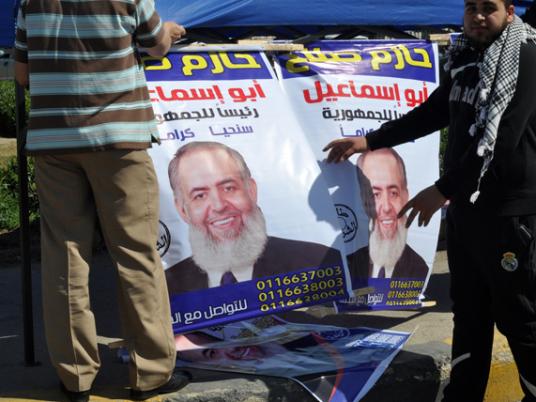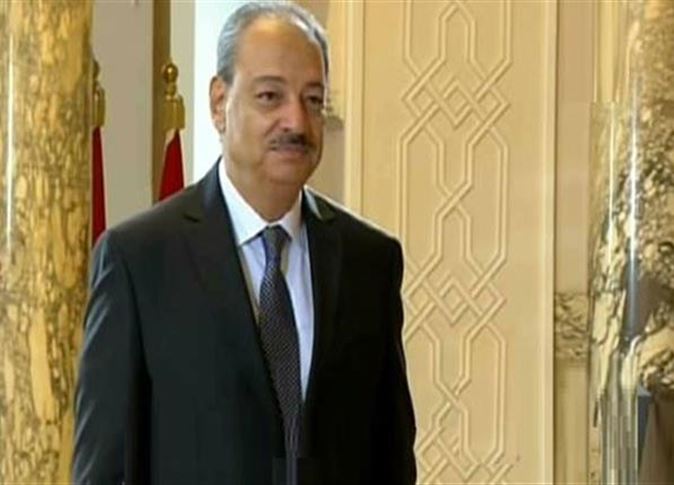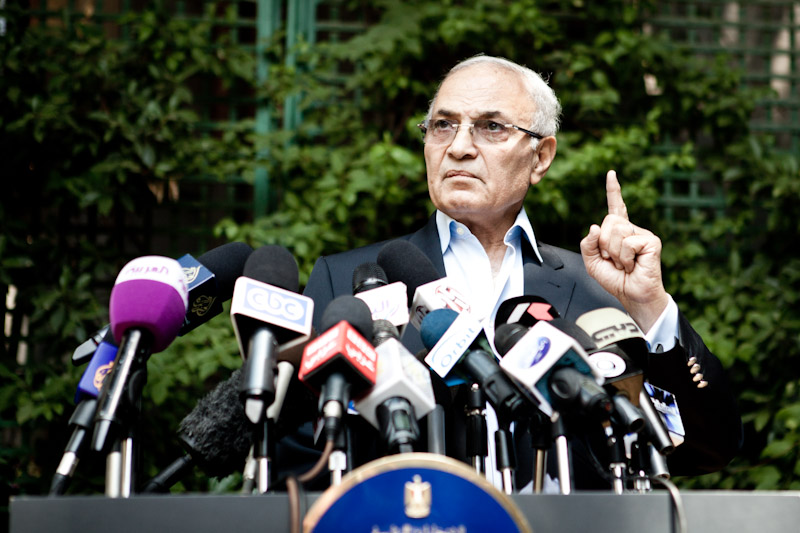
It is hard to go anywhere in Cairo these days without the watchful eyes of Hazem Salah Abu Ismail following you. Posters for the Salafi presidential candidate are plastered to car windshields, alleyway walls, lamp posts and highway dividers. This would normally be considered diligent, and possibly effective, campaigning, but it might also be against the law.
Presidential candidates are supposed follow a strict set of financing and campaigning rules. The Presidential elections committee, composed of senior judges, is in charge of both setting the regulations and making sure the campaigns follow them. But for the most part, campaigners seem happy to ignore the rules, which don’t have effective enforcement mechanisms in place.
Candidates are restricted to an LE10 million spending cap for their entire campaign up to the 23-24 May elections. They are supposed to officially maintain a period of campaign silence until 30 April, while the official candidate list is set to be presented on 26 April. Campaigns are strictly forbidden from accepting foreign donations, and no individual can donate more than LE200,000 to any campaign.
During this period of supposed campaign silence, campaigning is also a violation of campaign laws and “could be punishable with up to 6 months in jail and/or a sizeable fine,” Secretary General of the Presidential Elections Committee Hatem Bagato told Egypt Independent. Bagato is also in charge of a special sub-committee that was established Sunday to follow-up on numerous complaints of presidential election campaigns’ violations.
While his campaign is the most visible, Abu Ismail is not the only candidate that appears to be breaking the rule.
“We’ve been campaigning on some levels; so has everyone. If you look at all the posters in the streets for certain candidates, you’ll see that there is no real law enforcing campaign regulations,” said Samy al-Nahary, a key member of Nasserist presidential candidate Hamdeen Sabbahi’s campaign.
The lack of follow-up during last year’s parliamentary elections, which were also governed by strict rules on campaigning, is the main reason many are skeptical about the implementation of rules this time around.
“There was not any follow-up to appeals or the implementation of any fines during the parliamentary elections, despite many evidenced claims and lawsuits against campaigns overspending and campaigning during the silence period,” said Yosri al-Azabawy, an elections specialist at Al-Ahram Center for Political and Strategic Studies.
The Presidential Elections Commission, according to Article 28 of the Constitutional Declaration, has the final say on elections rules and results, and its decisions cannot be appealed. Azabawy believes that, despite their ultimate authority, the commission will not be able to adequately monitor certain elements of campaigning such as spending, which many say impose unreasonable limits on candidates.
“The spending limit is completely unreasonable. I know that some candidates spent LE10 million on their parliamentary campaigns,” Azabawy said. The spending limit was LE500,000 for candidates in parliamentary elections, when constituencies rarely exceeded 1.5 million per district. Egypt has over 45 million potential voters for the presidential elections.
“Just do basic calculations on 27 governorates with over 220 administrative city centers and many villages per city. Basic pamphleteering will cost LE10 million,” Azabawy said.
Billboards alone can cost up to LE100,000 per month, while a half-page ad in some of the most widely circulated newspapers can cost just as much.
Ad mogul Tarek Nour once said that the most basic serious presidential campaign would cost at least 10 times more than the current cap.
“Some candidates, such as Abu Ismail, must have already bypassed the spending cap,” al-Nahary said. He believes that it is inevitable that Sabbahi’s, and every other major campaign, would have to bypass the spending limits.
Most of this excess spending will come from outside the official campaign funds that will be managed and monitored through one of the country’s main state-owned banks.
One ambiguous area in the application of the spending-cap is the difference between individual, non-campaign affiliated spending for a specific candidate, and official funding.
The Muslim Brotherhood have put forth Khairat al-Shater as their presidential candidate. Shater is a businessman and longtime Brotherhood leader who has reportedly used his personal wealth to fund the group. Between Shater's deep pockets and the Muslim Brotherhood's army of volunteers and logistical resources, his campaign may feel especially restricted by the campaigning regulations.
During the last parliamentary elections, the Brotherhood's Freedom and Justice Party were implicated in documented violations including breaking the campaign silence in the two days before elections and overspending as a party for the benefit of individual candidates.
“We will not spend over LE10 million, and in fact had originally planned on spending less. However many individuals and admirers of our candidate may decide to promote him,” said Medhat Hassan, the campaign manager for candidate Mohamed Selim al-Awa.
Outside many small mosques around Cairo, vendors and campaigners can be seen handing out pamphlets for Abu Ismail, and selling them at printing costs, though some say that they are not part of the campaign but just individual supporters. “I just like the guy and think that he is blessed,” said one of many vendors/campaigners outside an Old Cairo mosque after Friday prayer.
Abu Ismail campaigners said on many media outlets that they couldn’t be held accountable for how his admirers choose to support him.
Most campaigners believe that due to their candidate's popular support, they would not be able to control the unofficial campaigns their supporters might wage on their behalf.
Moderate Islamist candidate Abdel Moneim Abouel Fotouh has one such documented case of his supporters acting independently to create a volunteer database and full-on campaign independent from his official campaign. Azabawy says that, in principle, these campaigns should fall under campaign regulations, but the law and the elections commission’s application of campaign regulations does not clearly state whether or not these unofficial campaigns can campaign and spend individually.
Donors and candidates theoretically risk LE100,000 in fines and up to one year in prison for violations, according to the current laws that have been upheld from the previous constitution.
“If the parliamentary elections commission had decided to disqualify or heavily fine one candidate for certain infringements, that might have helped others at least pretend to follow the rules,” said Azabawy. Campaigns, he says should also be held responsible to non-campaign originated funding, to control laundered campaign financing. However Azabawy concedes that many of the commission’s laws are open to interpretation.
Most candidates are breaking the campaign silence rule and appearing at campaign rallies and other events. “We’ve voiced our objection to these restrictions many times, and of course Awa is always meeting voters and discussing his platform,” Hassan said.
Abouel Fotouh held a well-attended, and by appearances, expensive rally at Cairo’s Al-Azhar Park on Monday to unveil his platform.
Nahary believes that the rules and punishments regulating the presidential elections are residual from the previous regime, meant to support the incumbent power-players and marginalize others.
“In the presence of the military council, it is very worrying to feel so restricted campaigning, and then not be able to resort to due process regarding the elections commission’s decisions,” he said.
After 30 April, candidates will have a less than two months of official campaigning time before the election begins on 23 May.. “Student council elections require more campaigning time,” said Hassan, who is skeptical about the role of the new oversight body within the elections commission.
“We have already begun work, and are currently settling our mode of operation. We have received many claims of violations so far,” Bagato said. Despite being made up of judges, the sub-committee will send reports of violations to the public prosecutors, who would then send claims through normal legal due process.
Some campaign violations entail serious legal consequences. Accepting funding from non-Egyptians is punishable to up to five years in prison. At the end of March, the Justice Ministry announced it is investigating a claim that the Ansar al-Sunna al-Muhammadeyya, a Salafi religious association, received LE232 million in funding from outside of Egypt, some of which was earmarked to support an unspecified presidential campaign.
When asked if his committee will be able to overcome the issues facing parliamentary elections oversight — and the subsequent alleged lack of campaigning accountability — Bagato said, “I cannot evaluate their experience.”



